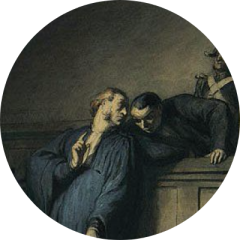In Brady v. Maryland, 373 U.S. 87, 87 (1963), the Supreme Court held that “the suppression by the prosecution of evidence favorable to an accused . . . violates due process [under the Fourteenth and Fifth Amendments] where the evidence is material either to guilt or to punishment, irrespective of the good faith or bad faith of the prosecution.” The three elements to a Brady claim – suppression, favorability, and materiality – have been voluminously discussed in the reports (though rarely by the Court), and can be rather confusing. What concerns us here, though, is the element of favorability: specifically, whether “evidence favorable to an accused” can include evidence that goes toward the constitutionality of a search, seizure, or interrogation.
“Favorable” generally means “exculpatory” or “impeaching.” The Court has explicitly included “impeachment” evidence – that is, any evidence that tends to harm the credibility of a government witness – within “exculpatory.” In Strickler v. Greene, the Court “disavowed any difference between exculpatory and impeachment evidence for Brady purposes.” 527 U.S. 263, 281-82 (1999). This makes sense. Merriam-Webster defines “exculpate” as “to prove that someone is not guilty of doing something wrong;” if evidence tends to impeach a witness, it tends to show that the witness can’t be relied upon to provide a sound basis for proving the defendant guilty. That is to say, if exculpatory information constitutes Brady, impeachment evidence constitutes Brady a fortiori.
So far so good. But what about evidence that a search, seizure, or interrogation was unlawful? For example, say the police did not have reasonable suspicion that someone they observed selling wares on the street was up to something illegal. But they came up to him based on a confidential tip that might not have supplied probable cause, and placed him under arrest, during the course of which they searched his backpack incident to arrest and discovered counterfeit D.V.D.s. The police subsequently provided the prosecution with the information regarding the tip only ten minutes before trial; the prosecutor does not advise defense counsel. The accused’s defense attorney does not file a motion to suppress, as he is not aware of the factual basis on which a motion might lie, but discovers over the course of cross-examining the police at trial that the evidence of the unlawfulness of the stop was suppressed. Was the evidence “favorable” for purposes of Brady?
On similar facts, the D.C. Court of Appeals recently said “yes,” as have at least three U.S. Courts of Appeals on similar facts. See United States v. Gamez-Orduno (9th Cir.); Nickols v. Gibson, (10th Cir.), Smith v. Black (5th Cir.). In fact, the United States Attorneys’ Manual requires disclosure of evidence that “might have a significant bearing on the admissibility of prosecution evidence.” U.S.A.M. § 9-5.001(C)(2). The Manual, however, categorizes such disclosures as “information beyond that which is constitutionally and legally required” to be disclosed. Id. (emphasis added).
When you think about it, though, such information should be constitutionally required to be disclosed (as several circuits and the D.C. Court of Appeals has already found), and Attorneys General and the U.S. Attorney’s office (and, indeed, the Court) should recognize this to be the case. If particular evidence is not admissible – for whatever reason – it tends to “exculpate” the defendant. This is so even if the accused was caught red-handed with contraband after an illegal stop, because if the evidence is inadmissible, he will be more likely to be deemed “not guilty” legally, if not factually. In short, Brady‘s favorability measure should be, not the factual “guilt” or “innocence” of a particular accused, but rather the likelihood of hindering a finding of legal guilt according to admissible evidence in court. This is particularly the case where the exclusionary rule is, Stone v. Powell and Hudson v. Michigan notwithstanding, “an essential part of both the Fourth and Fourteenth Amendment.” Mapp v. Ohio, 367 U.S. 643 (1961). To my mind, that would be the proper interpretation of the “favorability” element of Brady.
As Judge Kozinski recently and accurately observed, “[t]here is an epidemic of Brady violations abroad in the land.” United States v. Olsen (dissenting from denial of rehearing en banc). And he was talking about normal impeachment evidence at trial! Imagine, if you can, how many more such violations exist with respect to the constitutionality of searches, seizures, and interrogations – restrictions the police often consider nothing more than mere impediments to “good police work,” and toward which prosecutors often turn a blind eye. The Court should take up the question – and soon – and rule that such evidence is “favorable” within the meaning of Brady and the Fifth and Fourteenth Amendments.
